Smoke & Salt
Brixton
Close
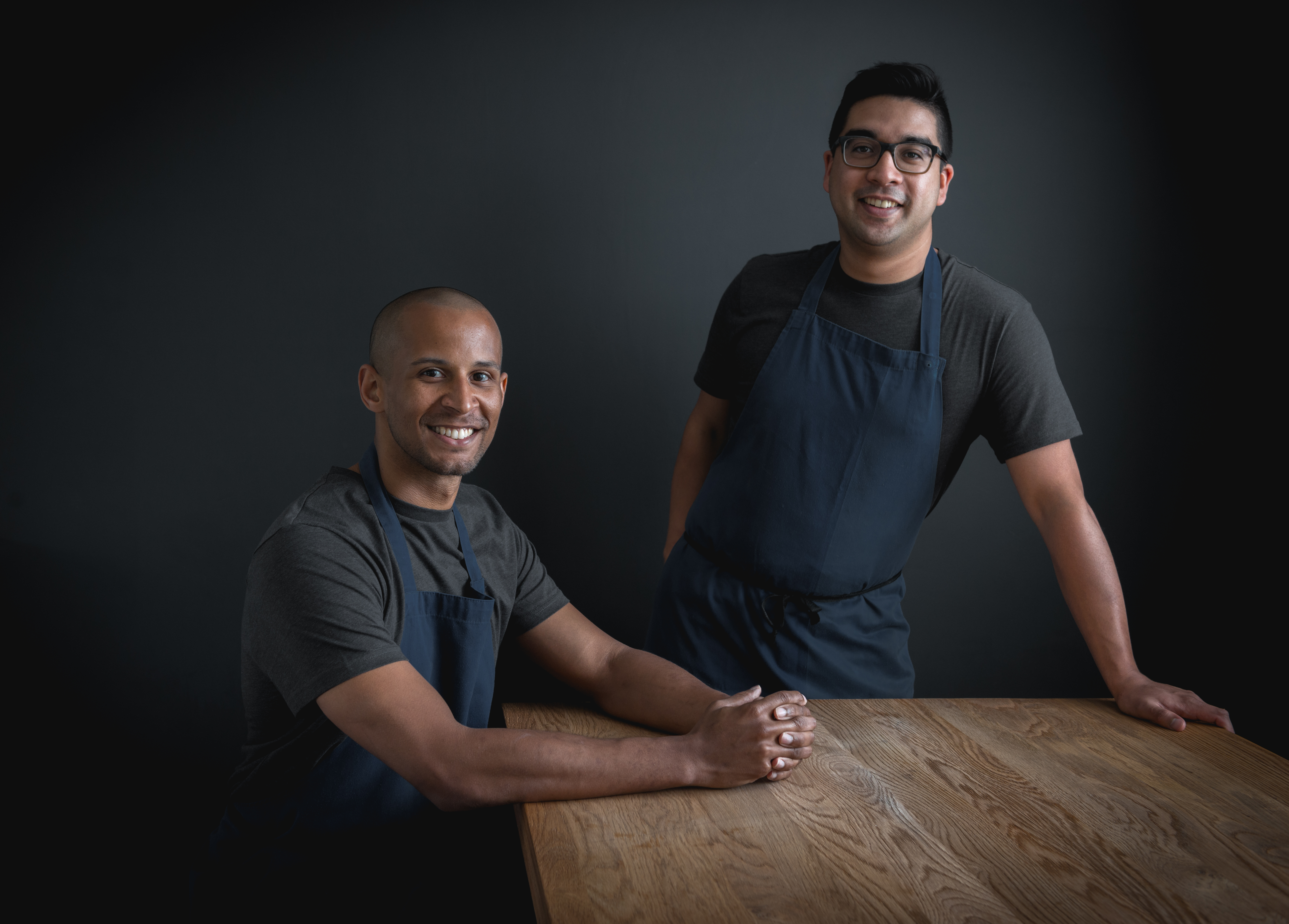
‘Modern dining and ancient techniques’.
What’s the first thought that comes to mind when these phrases are strung together? Cavemen eating in their finest? Or East London hipsters at it again, claiming that something was cool before anyone else did? Funnily enough, it’s actually the ethos behind Brixton restaurant Smoke & Salt.
As the name suggests, there’ll be plenty of smoking and salting involved, but the name also refers to the different styles of cooking and the chefs’ use of ‘ancient’ techniques to prepare food — so expect lots of curing, pickling and preserving as well.
“Oh god. That tagline is going to follow us to our graves isn’t it?” co-founder and co-head chef Aaron Webster laughs. “We created a company name not only with modern dining in mind, but because we’ve always done small sharing plates and set menus,” adds co-founder and co-head chef Remi Williams. “The overarching thing about the ancient techniques — which have been going on around the world in the last millennia — we feel it brings out so much flavour in the food.”
The pair met while working together at The Shed in Notting Hill. While Webster grew up in the UK and worked in the kitchens of The Latymer at Pennyhill Park Hotel and Dinner By Heston, Williams has lived all over in Nigeria, the UK and Boston, where he worked at Michelin-starred Craigie on Main and Deuxave.
Being chefs from fine-dining backgrounds means that food is at the forefront of everything they do. With shared kitchen responsibilities sorted and workloads split evenly, they play to each others’ strengths and run things like clockwork. Williams (who almost became an accountant in a previous life) handles the accounting and business side of the operation, whereas Webster’s skillset leans artistic and hands-on — perfect for the development of creative recipes. Ultimately, the two always work together as a unified front.
Their unique approach sees them focusing on seasonal British ingredients, preparing each item slowly and deliberately. The prep work might take longer, but this allows them to preserve and keep ingredients vital when certain foods are out of season. The majority of ingredients see a hot chargrill, and when topped with the duo’s homemade labneh, jalapeno salsa or preserved gooseberry, each dish is elevated to a new dimension. The result is a small and precise menu that appears deceptively simple, albeit with a myriad of seasonings and execution behind each dish, that draws inspiration from different cultures and traditions from around the world with an emphasis on technique and flavour.
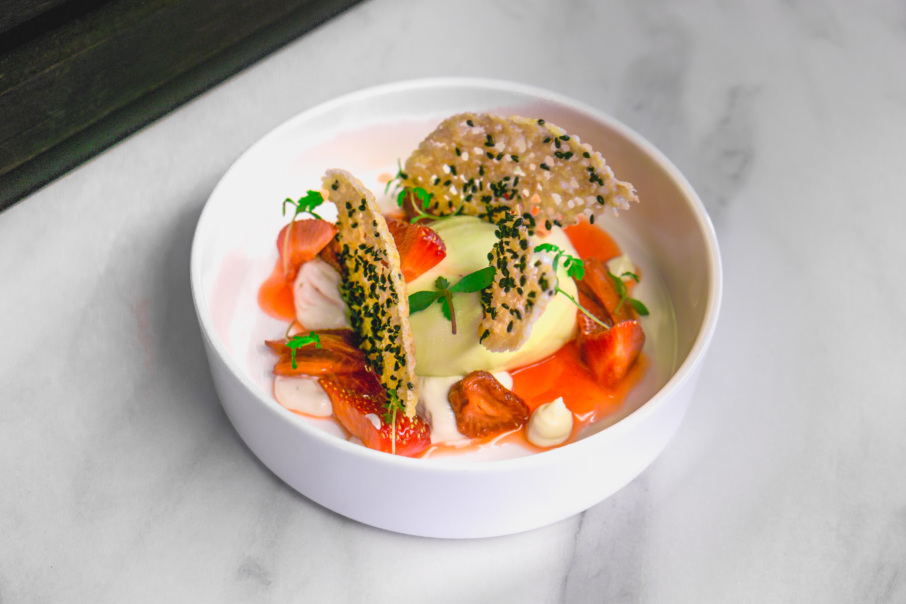
In 2014, the entrepreneurial chef duo left The Shed to join forces and start a new project, and Smoke & Salt began its life as a series of monthly supper clubs. Williams and Webster were cooking in their own kitchens at home, exasperating their other halves by hogging freezer space and using cheap baking trays from Poundland and a £20 Argos barbecue as equipment. Before long, they started to make a name for themselves and became one of the city’s must-attend supper clubs, before rapidly selling out residencies at Chapel Bar in Islington and Platform 1 in East Dulwich.
Small but mighty
Suddenly finding themselves with a team of four full-time and two part-time staff, Smoke & Salt were ready to settle down and move into a more permanent home. When Kricket’s old site in Pop Brixton opened up in 2017, the pair jumped at the chance, knowing that they had big boots to fill in following in their predecessor’s success. Their 40ft shipping container space can squeeze in 27 covers (31 on a good day, if you include the tables on the deck that overlooks the busy south London containerville below), but while they may be restricted in square footage, they’ve put every inch of space to good use.
“We treat this place as a proper restaurant and Pop Brixton has been amazing for nurturing younger businesses and start-up restaurants, as they provide low start-up costs and a bustling environment,” explains Williams. “We not only wanted to do Kricket justice, but we wanted to do ourselves justice by putting as much effort into creating our vision. We want people to think it’s not just another pop-up, and it’s been hard work making this space into a proper restaurant.”
From cobbling together funds from their savings to friends chipping in to help with everything from the design and photography, and somehow managing to write a menu in the midst of it all, Smoke & Salt is a collaborative passion project that comes from a place of love, hard work, and dedication.
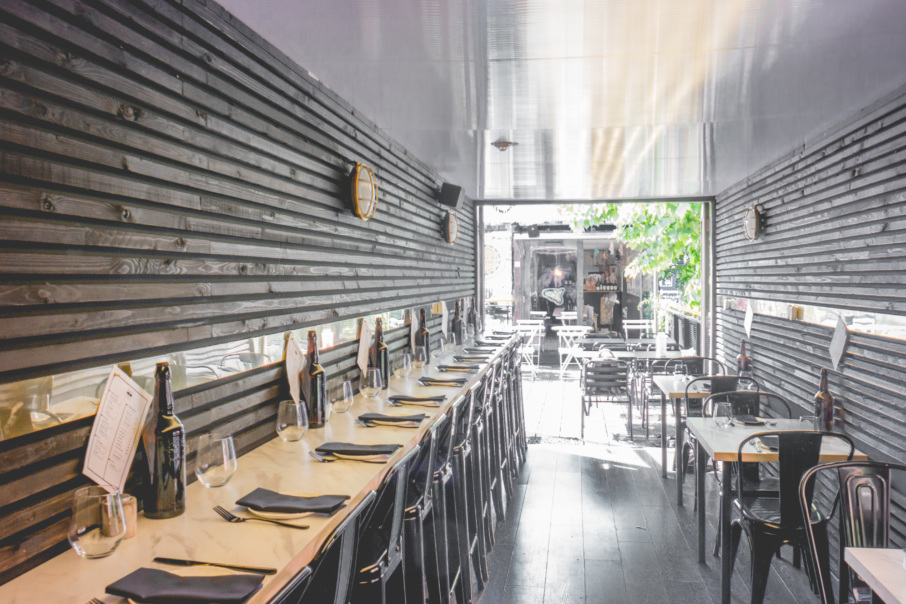
“On the day of opening, we were still screwing the lights up on the ceiling — that’s how tight it got,” Williams admits. “We wanted to have this relaxed dining environment with a slick vibe. Aaron even spent months building this epic playlist which had a 95% good response from most diners.”
“I think you mean 95% hit after hit.” Webster chimes in, laughing.
The unusual restaurant is a reflection of the duo in terms of design, service and food; cosy, modern and slick, with an informal vibe that complements the food perfectly.
“Coming from supper clubs where you’ve had to share a fridge with someone, and the kitchen prep space isn’t as clean as you’d like, or having a seating plan that isn’t yours,” Williams explains. “Even though the space is small, it’s a space that we can call our own, put our own brand and stamp on it.”
As if on cue, halfway through chatting to the pair about how they’ve managed to cram an entire restaurant into a single shipping container, a customer walks in and interrupts our conversation to enquire whether it would be possible to make a private booking for 40 people.
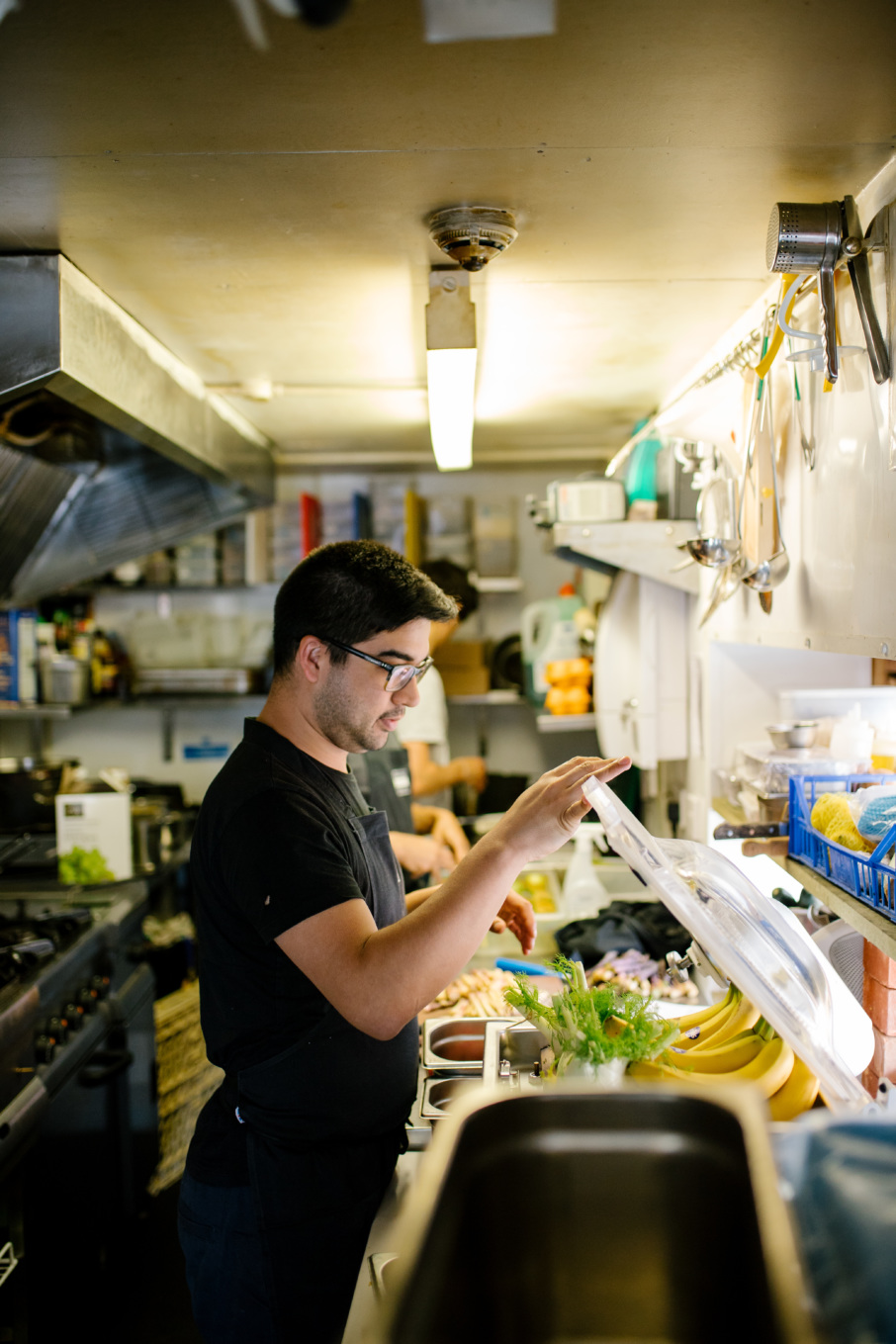
“Looking around, it’s not possible and even if we wanted to, it’s not worth our time because we don’t have the staff and capacity to take that on,” Webster explains. “It can be frustrating at times being in a cramped space and cooking restrictions to do certain things or the ability to take on larger bookings. At some point we’d probably want a proper brick and mortar place, but we’re pretty happy here for the time being.”
They’ve certainly come a long way from their days of relying on Poundland equipment. And while their menu keeps changing and evolving over time, their ancient cooking techniques that they’ve made their own pretty much remains at the heart of the operation.
Change is good
At Smoke & Salt, the chefs change the menu every 8 weeks — that means roughly 12 new dishes to come up with every couple of months, a feat that’s very rare for other restaurants in London to replicate.
“Two reasons”, Williams begins. “Firstly, we get bored, and you will not speak to any chef that won’t get bored of cooking the same dish about 4 weeks — once it’s easy, it’s boring,” he points out. “Secondly, for the guest experience, and to keep things interesting enough for customers to keep coming back again and again.”
The pair have managed to create one of London’s most affordable tasting menus, where dishes are designed to be shared, and interesting flavour combinations come first. Currently on the menu is one of Webster’s favourites, a salted pork steak dish. Take a whole shoulder of pork that’s been deboned with sinew taken out; cut it into steaks and brine for a few days with a 60/70% brine, then grill over charcoal. The final dish is served with spring greens, brown butter, capers and a pickled rhubarb chutney.
“That balance of fresh rhubarb chutney and pickled rhubarb — you’ve got this preserved salt pork steak, it’s slightly on the salty side with that gammon unctuousness,” describes Webster. “By incorporating these techniques in a modern way and using ingredients that compliment one another, dishes really do come together.”
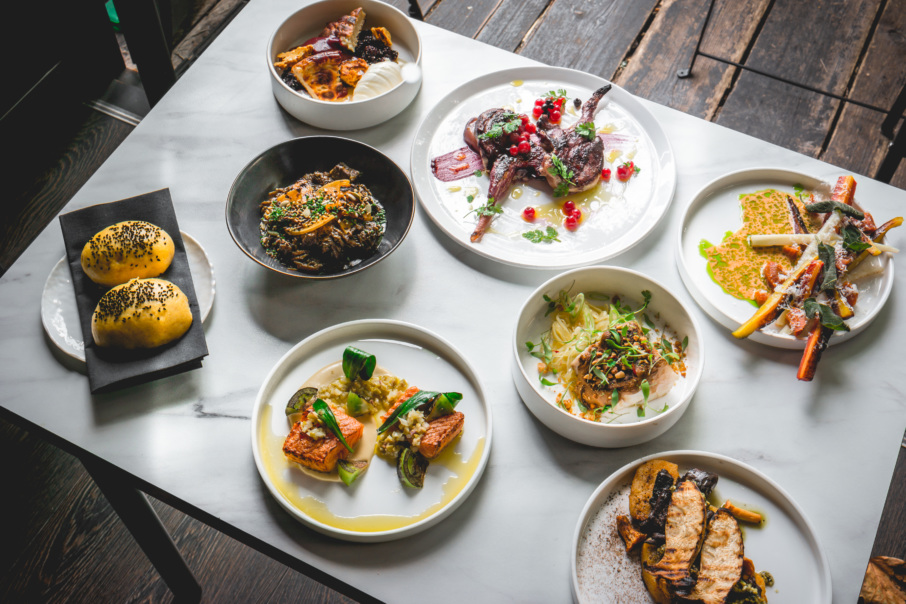
The special challenge is where Williams and Webster don’t set themselves huge pressures of changing the menu too often, but are still able to try out new things and push themselves as cooks. “If you go to bigger restaurants, they’ll have a full testing department,” Williams tells me. “We’ve kind of had to test as we go along, within reason, and it’s worked out all right so far.”
Mind over matter
Two years in, the pair had quietly garnered attention from the press with The Sunday Times’ Marina O’Loughlin describing their cooking as ‘properly exciting’ and Keith Miller at The Telegraph hailing them as the ‘buccaneers of brine’. 2018 showed no signs of slowing down, as they bagged a nomination for Best Breakthrough award from GQ and best newcomer title at The Catey awards under their belt. Smoke & Salt might be making waves from their south London home — good reviews and shiny awards aside — but they’ve been at it non-stop since they’ve opened, and more often than not the two spend more time together than with their families.
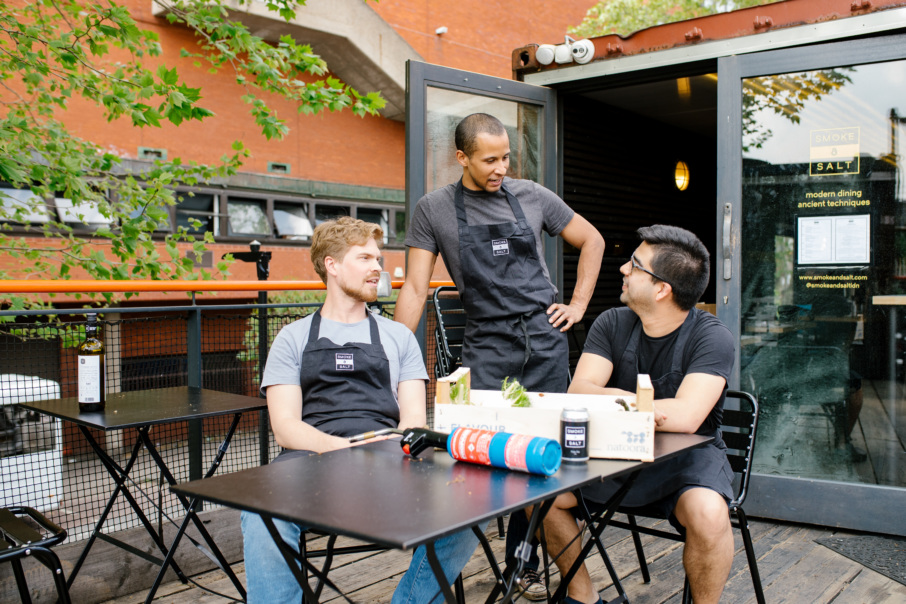
“Hospitality is hard, and anyone who goes into this business without accepting that will have a shock. This industry is tiring with long hours, you get burnt and it’s hot, but being a business owner on top of that means you have to be on it all the time,” Webster explains. “We definitely don’t take enough time for ourselves; we’re starting to learn about the structure, and working to improve the flexibility of the work/life balance.”
“It’s not only about the food, it’s about how to run a company and look after mental health. It’s important to promote wellbeing in our small family, so closing back-to-back on Sundays and Mondays was a no-brainer decision. We’re going to slightly lose out on revenue, but it’s much better than to crash and burn out,” he added.
There’s a lot of burden for those working in restaurants to ensure things are running smoothly, to keep on top of the food and make sure all the guests are having a good time.
“Until we’ve decided to pack it all in or retire, we love what we’re doing, and we’re bosses of our own business — it’s more of ‘why would we not do this together?’” Williams smiles. “And keep doing what we’re doing. As long as we’re making money, staying afloat and we’re happy, then I think we’re okay.”